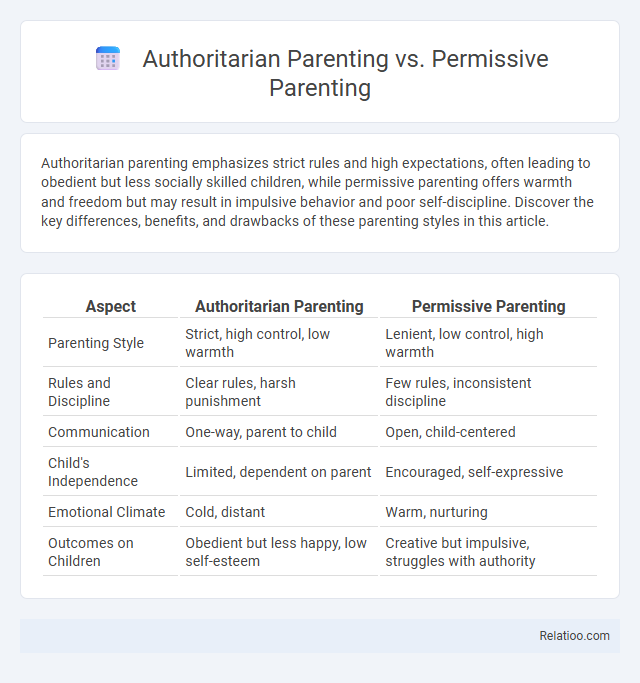Authoritarian parenting emphasizes strict rules and high expectations, often leading to obedient but less socially skilled children, while permissive parenting offers warmth and freedom but may result in impulsive behavior and poor self-discipline. Discover the key differences, benefits, and drawbacks of these parenting styles in this article.
Table of Comparison
| Aspect | Authoritarian Parenting | Permissive Parenting |
|---|---|---|
| Parenting Style | Strict, high control, low warmth | Lenient, low control, high warmth |
| Rules and Discipline | Clear rules, harsh punishment | Few rules, inconsistent discipline |
| Communication | One-way, parent to child | Open, child-centered |
| Child's Independence | Limited, dependent on parent | Encouraged, self-expressive |
| Emotional Climate | Cold, distant | Warm, nurturing |
| Outcomes on Children | Obedient but less happy, low self-esteem | Creative but impulsive, struggles with authority |
Understanding Parenting Styles
Authoritarian parenting emphasizes strict rules and high expectations, often leading to obedience but potentially causing low self-esteem and anxiety in children. Permissive parenting is characterized by warmth and leniency, which may result in a lack of boundaries and challenges with self-discipline. Understanding these styles helps you recognize how parenting behaviors impact emotional development and family dynamics, highlighting the importance of balanced approaches to avoid dysfunction.
Defining Authoritarian Parenting
Authoritarian parenting is characterized by strict rules, high demands, and little emotional warmth, often emphasizing obedience and discipline over open communication. This style contrasts sharply with permissive parenting, which involves leniency and a lack of consistent boundaries, potentially leading to behavioral issues and confusion in children. Dysfunction in parenting emerges when either extreme results in neglect, emotional harm, or impaired child development, highlighting the importance of balanced, supportive caregiving strategies.
Characteristics of Permissive Parenting
Permissive parenting is characterized by high responsiveness and low demands, where parents exhibit warmth and acceptance but provide minimal discipline or structure. Children raised under permissive parenting often experience limited boundaries, which can lead to difficulties with self-regulation, impulse control, and authority. This parenting style contrasts sharply with authoritarian parenting's strict rules and high expectations, and may contribute to dysfunction when children lack guidance and consistent consequences.
Key Differences Between Authoritarian and Permissive Parenting
Authoritarian parenting emphasizes strict rules, high expectations, and disciplinary measures, often leading to obedience but limited emotional openness, whereas permissive parenting is characterized by warmth, leniency, and few boundaries, resulting in increased freedom but potential behavioral issues. Key differences include the level of control: authoritarian parents enforce rigid guidelines, while permissive parents adopt a more flexible, child-centered approach. Dysfunction can arise when either style lacks balance, with authoritarian methods potentially causing anxiety and low self-esteem, and permissive styles possibly leading to impulsivity and poor self-regulation.
Impact on Child Development
Authoritarian parenting, characterized by strict rules and high demands, can lead to children developing lower self-esteem and social competence, often resulting in increased anxiety or aggression. Permissive parenting, marked by high responsiveness but low discipline, may cause children to struggle with self-control and exhibit behavioral issues due to lack of boundaries. Dysfunctional parenting patterns, which combine inconsistent or harmful behaviors, significantly impair emotional regulation and cognitive development, hindering Your child's ability to form healthy relationships and adapt to social environments.
Effects on Academic Performance
Authoritarian parenting, characterized by strict rules and high expectations, often leads to increased academic discipline but may trigger anxiety and lower creativity in children. Permissive parenting promotes autonomy and warmth but risks academic underachievement due to lack of structure and consistent guidance. Dysfunctional family environments, marked by neglect or conflict, significantly hinder academic performance through emotional distress and reduced cognitive support.
Emotional Well-being of Children
Authoritarian parenting, characterized by strict rules and high demands, often leads to lower emotional well-being in children due to increased anxiety and reduced self-esteem. Permissive parenting, which emphasizes leniency and few boundaries, can result in poor emotional regulation and behavioral issues, as children lack guidance and discipline. Understanding these dynamics is crucial for your child's emotional development, as both extremes risk fostering dysfunction rather than resilience and healthy self-expression.
Long-term Consequences of Each Style
Authoritarian parenting often leads to children developing low self-esteem, increased anxiety, and difficulties in social competence due to its rigid and punitive nature. Permissive parenting can result in poor self-discipline, impulsivity, and challenges in authority respect as children lack consistent boundaries. Dysfunctional parenting, characterized by neglect or inconsistent care, frequently causes long-term emotional instability, attachment issues, and higher risk of mental health disorders.
Finding a Balanced Approach
Authoritarian parenting, characterized by strict rules and high expectations, often leads to compliance but may hinder emotional development, while permissive parenting, marked by leniency and low demands, can result in a lack of discipline and self-control. Dysfunction in parenting arises when extremes in either style cause inconsistent boundaries and emotional neglect, impairing child development and mental health. Finding a balanced approach involves combining clear structure with empathy, promoting both responsibility and emotional support to foster well-rounded growth in children.
Choosing the Best Parenting Style for Your Family
Authoritarian parenting emphasizes strict rules and high expectations, often leading to obedience but potentially causing low self-esteem, while permissive parenting offers warmth and freedom but may result in lack of discipline and poor boundaries. Dysfunctional parenting combines neglect, inconsistency, or conflict, which can negatively impact a child's emotional and psychological development. Choosing the best parenting style for your family involves balancing structure and support to foster resilience, emotional health, and social competence in your child.

Infographic: Authoritarian Parenting vs Permissive Parenting
 relatioo.com
relatioo.com